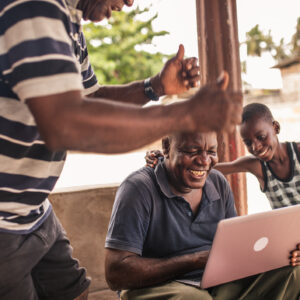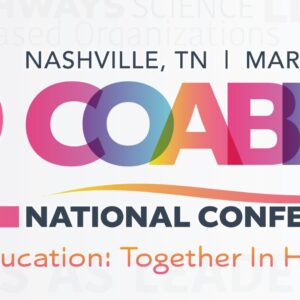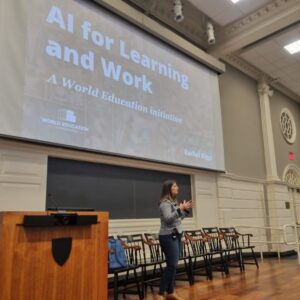By Karisa Tashjian
With a new decade upon us, it’s an ideal time to take stock of the remarkable changes in the ways that technology has affected our lives over the past ten years. The iPad debuted, mobile devices are widespread, more time is spent using social media, a “gig” economy has emerged, and more. Yet, the very tools and systems designed to boost access or streamline our lives may actually be exacerbating inequities — and marginalizing millions of Americans. Today, tens of million adults lack the skills to navigate and thrive in an increasingly tech-driven society and workplace.
At the annual National Transition to College Conference (NCTN) in Cambridge, MA in November 2019, a panel hosted by World Education’s EdTech Center in partnership with the newly formed Digital US coalition explored the topic “Envisioning an Ecosystem that Supports Digital Skills and Lifelong Learning for Adults”. The EdTech Center supports Digital US on its efforts to ensure that adults across the U.S. have foundational digital skills to thrive in work and life by 2030. Digital US partners are collaborating and innovating in unprecedented ways to make critical onramps to participation in our digital economy – including supports for technology access and digital skills development – both radically accessible and effective.
Panel members included Ana Negoescu, Manager of Integration Programs at National Immigration Forum, Dr. Kathy Harris, Assistant Professor, Applied Linguistics, Portland State University, Wendi Copeland, Chief Mission and Partnership Officer at Goodwill Industries International and Jamie Harris, Adult Education Program Specialist, Division of Workforce Development and Adult Learning, Maryland Department of Labor who shared their stories, expertise and resources of how adults with basic skills gaps and/or low incomes are being equipped with technology skills for today and the future. Dr. Jen Vanek, Director of Digital Learning and Research of the EdTech Center, introduced the panel and Karisa Tashjian, Director of Education, Providence Public Library, served as the moderator.
Ana described her work in bringing mobile learning to scale through Skills and Opportunity for the New American Workforce, a first-of-its-kind industry-contextualized English-language learning program for frontline limited-English-proficient workers across the country in partnership with leading employers. Kathy gave a research perspective on technology integration, digital literacy and evidence-based practices. Her research focuses on adult digital literacy acquisition in vulnerable populations with a recent focus on digital literacy in the context of health and work. Wendi shared how Goodwill organizations across the country are providing digital literacy instruction including through partnerships such as with Google through the Goodwill Digital Career Accelerator. Jamie outlined Maryland’s digital literacy initiative and how they are prioritizing foundational work through digital literacy frameworks and creating their own unique framework for adult learners.
Panel members and audience input made clear that there are several shared priorities for ensuring adults have the digital skills to thrive, and gave examples of promising work in towards meeting them:
- Building foundational digital literacy skills, including those of practitioners who work with adults with low basic skills, is essential. Goodwill’s GCF Learnfree.org is a valuable free digital literacy resource that is widely used to build skills.
- Implications of who has access and intended and unintended consequences of adopting digital resources for use with learners who lack access must be considered in all efforts. A growing number of public libraries now loan wifi hotspots. Providence Public Library’s adult literacy programs loans laptops and hotspots to some of their students.
- Evidence based practices do exist and resources such as California’s Outreach and Technical Assistance Network (OTAN), World Education’s EdTech Center, and the federal Department of Education’s LINCS tools should be actively used. However, there is still a need for continued research on what works and what doesn’t work in ensuring that all adults are included in our tech-driven society and workplaces.
- Designing “on-ramps” and “pathways” are essential for adults with low basic skills as they provide transparent entry points and opportunities for progressing along a continuum of digital skill building. Providence Public Library’s Technology Pathway provides no or low barrier free opportunities for adults to build basic digital literacy through coding and data literacy skills. Maryland’s Division of Workforce Development and Adult Learning is crafting a digital literacy framework to map out skills pathways to inform instruction in its adult basic education programs.
- Partnerships and collaborating are game-changers in helping adults gain skills. The Language Literacy and Technology Research Center at Portland State University has partnered with Mutual Housing California to create relevant digital literacy curricula, making it possible for residents to boost both digital health and financial literacy.
- Innovation and new ways of looking at persistent and emerging challenges should be considered whenever possible – solutions are possible. Under the Skills and Opportunity for the New American Workforce project, the EdTech Center supported the National Immigration Forum on delivering and scaling a 100% distance workplace English training model. In this innovative, mobile-enabled model, immigrant learner-workers accessed remote, synchronous instruction through a live, virtual classroom and completed self-paced activities anytime, anywhere. Learn more about the innovative pilot in the Upskilling New Americans Report.
Inspired by the panelists’ work and stories, there is tremendous potential to ensure that all adults have the opportunity to successfully pursue and acquire digital skills to thrive in the next decade and decades to come. It will require a collective and multisector effort. The collaboration between diverse partners in the Digital US to create new models of accessible supports for adults to develop foundational digital skills at scale, and continued discussion and sharing of effective practices, such as through the NCTN EdTech Center panel, will make a difference in the lives of tens of million adults.




